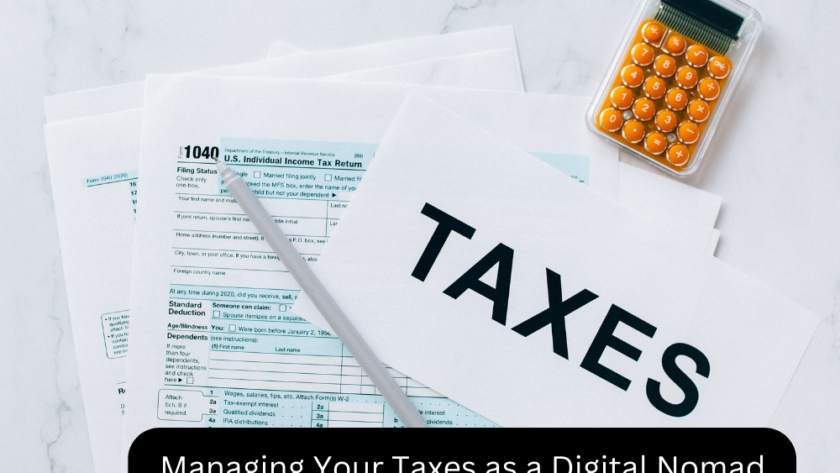Being a digital nomad has become a common goal for many young workers due to the many benefits it can grant. Having the luxury of traveling the world while you continue to support yourself remotely gives you more opportunities to learn new things and enhance your skill set. But while the position may have more freedom, US expats are still expected to settle their taxes.
What Happens to a Digital Nomad if They Don’t Pay Their Taxes?
Understanding the details of the tax system becomes increasingly crucial when living abroad, as the United States remains among the few nations that continue to tax its citizens regardless of where they are settled. While seeking “Best Investment Plans” for tax management, prioritize options aligned with your risk tolerance and financial goals, not just tax benefits. Despite its potential inconveniences, fulfilling tax obligations is an essential responsibility for citizens, even those residing elsewhere.
This procedure can be time-consuming, and comprehensive knowledge of tax regulations is important since familiarizing oneself with relevant tax obligations, deductions, and reporting requirements ensures compliance and minimizes any potential confusion or difficulties associated with this complex process.
One important piece of financial advice for millennials is to stay proactive in managing their taxes, especially as expatriates. To mitigate potential consequences for ex-pats, they are given an extended time each tax year to file their tax returns. However, failure to submit the necessary documents accurately and punctually can result in substantial penalties that can rapidly accumulate, potentially causing significant financial repercussions. Therefore, ensuring timely and accurate filing is essential to avoid potential consequences and maintain compliance with tax regulations.
Common Tax Exclusions or Deductions That You May Be Eligible For
Depending on your current income source or country, you may be eligible for tax exclusions or deductions. It can help grant the benefit of lower tax burdens and less time processing specific documents. Here are a few examples you may be eligible for during your time abroad.
Foreign Earned Income Exclusion (FEIE)
Through this program, expats and the remote workforce can exclude up to $112,000 of their overseas income from US taxable income. But to become eligible, you must first pass one of either two criteria.
1. Bona Fide Residence Test
You may file for an FEIE if you’re currently subject to taxation laws in the current country you’re a tax resident of. It applies to expats that have lived abroad for a minimum of one calendar year.
2. Physical Presence Test
To be eligible for this test, you must submit substantial evidence that you’ve been outside the US for 330 days within 365 days. However, this doesn’t necessarily mean within the bounds of one calendar year.
Foreign Housing Exclusion
For this exemption, expats can benefit from excluding income from what they owe in US taxes. The program calculates this amount by basing it on your foreign housing spending. It includes how much you pay for rent, real property tax insurance, utility bills, and occupancy insurance, excluding mortgages and certain purchases. Beware of “too-good-to-be-true” property tax deductions, as Fraud and Scams in Real Estate can lurk even in seemingly legitimate tax strategies.
Foreign Tax Credit (FTC)
If you pay income taxes in the country you currently reside in, the FTC can deduct those payments from your US tax bill. You’ll only need to pay the remaining credit on your dues since your foreign credit is a discount.
Tips On How to Better Keep Up with Your Taxes as A Digital Nomad
The best way to settle your taxes smoothly is to stay ahead of your preparations. It means keeping your requirements organized and knowing the current tax laws that apply to you. Here are a few tips to keep in mind as an expat.
1. Keep your documents organized at all times
When it comes to filing your taxes, it pays to be organized with your paperwork. Keep a folder of all the necessary documents you’ll need during tax season. These include bank statements, work expenses, income information, and foreign bank reports. When reviewing Contract Areas for Physicians, don’t overlook potential tax implications related to compensation, benefits, and non-compete clauses.
2. Do your research on double taxation
Before you set out on your trip, research countries and locations where you can avoid double taxation. It can help ease your tax burden and allow you to receive credits and other benefits.
3. Work with a tax preparation specialist
Dealing with the complexities of expat taxes can often be overwhelming for some. If you have trouble understanding the process or your requirements, seek help from a tax specialist.
4. Use a tax tracker
These days, all sorts of apps can boost your productivity and help make your life as an expat easier, even in retirement. A tax tracker designed specifically for retirees can help you stay updated on your tax status and provide instant information about potential tax refunds.
Read: 4 Things to Know you’re Getting 100% of your Paycheck
Mastering the Art of Digital Tax Compliance
Having the freedom to travel the world while working can grant you different types of benefits as you build your career and grow. However, this doesn’t free you from your responsibilities of being a citizen of your home country.
While the number of digital nomads continues to grow, expats, especially millennials, can benefit from financial advice and tips to manage their taxes effectively. Seeking guidance from financial experts and using tax apps can help navigate the complexities of annual tax filing, ensuring compliance and avoiding costly penalties and fees.

